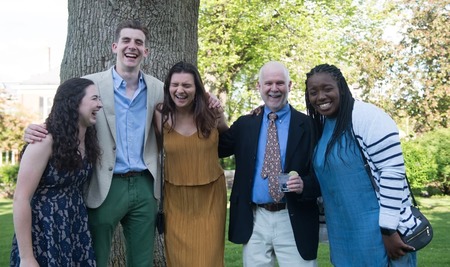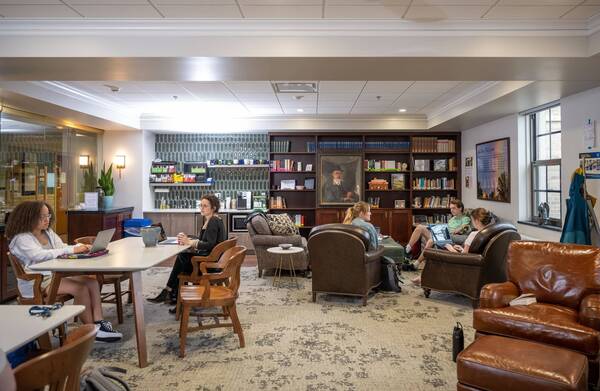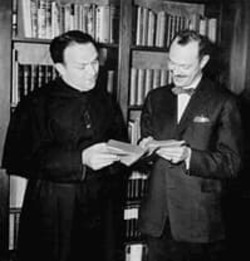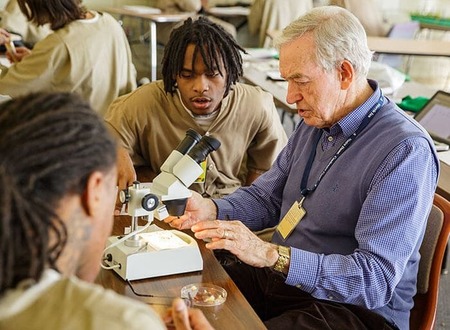About
Who Are We?

PLS is not just a major. It’s a community. Following an integrated curriculum composed of small discussion-based Seminars and Tutorials spanning the arts, history, literature, natural and social sciences, philosophy, politics, and theology, students and professors join a vibrant conversation about what it means to be human.
The Program of Liberal Studies is grounded in a Catholic educational philosophy that values the integration of all forms of knowledge, an openness to truth wherever it may be found, and the holistic education of the entire human person.
Alongside a dynamic multidisciplinary research faculty committed to the values of liberal education and thoughtful peers with a variety of perspectives and backgrounds, you will gradually cultivate habits and practices of thought that are aimed at the transformation of the whole person. Through dialogue with one another, our faculty, and the classic texts on our reading list, you will not only become conversant with new and sometimes unsettling viewpoints, but also develop the humane virtues of thoughtfulness, generosity, curiosity, creativity, humility, and empathy.
In the tradition of the liberal arts and in the spirit of friendship, you will read widely, listen sympathetically, question boldly, think rigorously, write persuasively, communicate clearly, argue civilly, and live freely. If you’re looking for a university education that will change your life and give you lasting intellectual friendships, join us!
What Do We Do?
At the core of PLS are the Great Books Seminars: small classes of 10-16 students devoted to the study of foundational texts beginning in ancient Greece and ending in mid-twentieth-century America. There are no textbooks in these seminars. Rather, students encounter a wide variety of primary works that have shaped individuals and societies, influenced historical change, and continue to inspire and trouble readers today.

These works will challenge you, but the process of reading, discussing, and interpreting them in a guided community will help you understand and appreciate their significance. We do not consider these “great books” to be a static canon but a dynamic, living tradition that is open to ever-new interpretations.
Complementing the Great Books Seminars is a required sequence of Tutorials in literature, philosophy, theology, political theory, music and aesthetics, intellectual and cultural history, and the natural and social sciences. In introducing you to the methods and concerns of individual disciplines, the Tutorials will enable you to read the Seminar texts in new ways and to consider critical perspectives.
An Education for Everyone

PLS finds its roots in a revolutionary movement that sought to encourage truly democratic education in the United States in the early twentieth century. After the First World War, Professor John Erskine established a General Honors course at Columbia University in which students read and discussed “great books” in translation without lectures or interpretations imposed by faculty. Many of Erskine’s colleagues doubted the capacity of undergraduates to handle such a program, but Erskine persisted, inspired in part by his experiences teaching enlisted men at the American Army University in France.
In the 1920s, a group of Erskine’s students began leading “great books” discussions at the People’s Institute in New York City, an adult education program started by Columbia University professor Charles Sprague Smith in the late nineteenth century to engage the working and poor immigrant population of New York City in the study of the liberal arts without regard for religion, race, socio-economic status, or educational background. One of the Institute’s instructors and General Honors alumnus, Mortimer Adler, helped to establish the great books Core Curriculum at the University of Chicago, but remained committed to a broader vision of education as well. With the support of Chicago’s president, Robert Hutchins, Adler created the Great Books of the Western World, a subscription series published by Encyclopedia Britannica aimed at everyday working people in the belief that all should have access to the best of what had been thought and written in the Western tradition.
In 1950, one of Adler’s editorial assistants on this project, Otto Bird, a scholar of medieval philosophy and theology, was invited by then-president John J. Cavanaugh, C.S.C., to bring this democratic education and ethos to the University of Notre Dame. Cavanaugh, who had joined the board of directors for Adler’s Great Books Foundation the previous year, hoped that this curriculum would speak to a student population that was rapidly diversifying after the Second World War. Intellectual freedom and intellectual challenge were core tenets of the Great Books movement, and indeed, it was in this new Program that books then banned by the Roman Catholic Church were first read widely at the university.

PLS continues this radical democratic tradition of bringing education to marginalized communities and promoting freedom of thought and expression today.
As regular participants in the Moreau College Initiative at the Westville Correctional Facility, our faculty lead discussions of Milton and Shakespeare with incarcerated students. Current undergraduates in the Program introduce students attending South Bend-area public schools to the liberal arts through our Junior Great Books Program. Our faculty and students maintain relationships with the South Bend Center for the Homeless and other local service organizations, relationships that have led to nationally recognized collaborations.
As our Notre Dame community becomes more diverse, we remain committed to our original mission by continuing to expand the scope of the curriculum to include more voices that represent the best of what has been thought and written but have not always been recognized for their contributions to our shared intellectual and cultural life. The Program of Liberal Studies is an education for everyone.
All Are Welcome
As a Program that seeks to provide an education for everyone, PLS recognizes and is committed to defending the equal dignity of all persons, regardless of color, race, religion, ethnicity, nationality, gender, sexual orientation, or socioeconomic background. Furthermore, sharing the Catholic mission of the University of Notre Dame, PLS seeks to promote justice grounded in love, the love with which God created all things. For these reasons, we welcome all who come to our Program seeking knowledge and wisdom, and hope that they find with us a safe haven and an intellectual home. We also stand in solidarity with those who share the same values and are struggling for recognition, representation, and respect in our local community, our country, and around the world. In the Program of Liberal Studies, all are welcome.